Top 10 Historic Hotels
[b]Top 10 Historic Hotels[/b]
The hotel price comparison www.trivago.co.uk has put together a list of ten historic international hotels and the famous individuals they have received.
What makes a holiday special or a hotel stay unique? Trying out new cuisines and enjoying a break from the daily routine is part of it, but something more is required to transform a normal holiday into a truly unforgettable experience. Culture and history are the missing elements – they breathe life into a trip and stir the appetite for further knowledge. For this reason, www.trivago.co.uk has identified ten of the best rated historic hotels in Europe and the United States. From Washington and London to Krakow and Seville, these hotels will pamper their guests with first class service and a historical charm.
Here is the list of historic hotels in Europe and the United States, ranked according to ratings given by travelers.
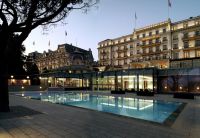 1. Palace Beau Rivage, Lausanne, Switzerland
1. Palace Beau Rivage, Lausanne, Switzerland
Situated on the Quai d’Ouchy waterfront in Lausanne, the five-star hotel Palace Beau Rivage commands a spectacular view of the beautiful Lake Geneva and snow-capped mountains of the Swiss Alps. Since its founding in 1861, the Palace’s original architectural style and décor have been rigorously preserved, and the hotel stands as a symbol of Europe’s aristocratic past. Many defining moments in world history occurred within its walls, such as the coronation of King Hussein of Jordan and the ratification of treaties on the reconstruction of Post-WWI Europe. World leaders and celebrities routinely stay at the Palace, and notable figures from history include Nelson Mandela, Charlie Chaplin and Victor Hugo. Top dining options, a wine cellar stocked with over 75,000 bottles, 168 luxurious rooms and walking distance to Lausanne’s lively downtown area combine to make a stay at the Palace Beau Rivage a truly memorable experience.
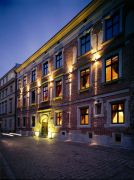
2. Hotel Copernicus, Krakow, Poland
Taking its name from frequent guest and world-renowned Polish astronomer Nicolas Copernicus, the Hotel Copernicus in Krakow is a living, breathing embodiment of medieval Europe. Formerly a meeting point for intellectuals and academics, the building was restored and reopened in 2000, and now offers guests a chance to stay in luxurious rooms styled after the high ceilings and dark wood furnishings of the Renaissance period. Hotel Copernicus is located on Kanonicza, the oldest street in the city, and is close to numerous cultural and historical sites such as the Royal Palace, various Gothic churches and cathedrals, and the historic Jewish quarter of Kazimierz.
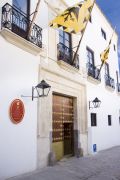
3. Las Casas De La Juderia, Seville, Spain
Located in the old quarter of Seville in Andalusia, Spain, Las Casas De La Juderia perfectly captures the beauty and spirit of the Andalusian heritage by blending together European and Arabic elements and designs. Open courtyards, graceful fountains and sweeping arches complement each other greatly and create an inspiring atmosphere. The name literally means ‘the houses of the Jewish quarter’, and refers to the historical period when Ferdinand III of Castile reclaimed the city from the Muslim Caliphates and concentrated the Jewish population into one district, or Juderia. Las Casas De La Juderia also was used to house the first native Americans brought back by Christopher Columbus after his first travels to the ‘New World’. Other notable attractions include the Cathedral and the Royal Alcazar Palace.
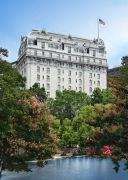 4. The Willard, Washington, USA
4. The Willard, Washington, USA
The Willard on Pennsylvania Avenue represents the pinnacle of American comfort and style, and this can clearly be seen from the hotel’s grandiose rooms, lavish spa- and health-treatments, and sumptuous dining opportunities. Founded in 1818, the Willard has often been described as the center of Washington’s political and social life – a reputation that is likely enhanced by the imposing presence of the White House, only a few streets away, and by the fact that Martin Luther King wrote his landmark ‘I have a dream’ speech while staying at the Willard. The surrounding area is also rich in scenic attractions, including the Smithsonian Museum, National Theatre, National Mall and numerous galleries and performing arts venues.
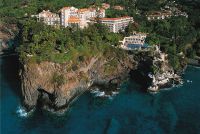 5. Reid’s Palace, Funchal, Portugal
5. Reid’s Palace, Funchal, Portugal
Located on a cliff overlooking the south coast of Funchal and first opened in 1891, Reid’s Palace was the crowning achievement of Scotsman William Reed, an impoverished cabin boy who landed on the island of Madeira at age 14 and eventually made his fortune in the wine trade. Although he did not live to see the hotel’s completion, Reid’s Palace quickly became a major attraction, in large part due to the small flotilla of boats and vendors that greeted each new guest upon arrival. Distinguished guests included playwright George Bernard Shaw, Prime Minister Lloyd George, and the ‘travelling Empress’, Elizabeth of Austria, known for her extensive travels after the suicide of her only son Rudolf. Today, the feeling of nobility remains, and chief among the hotel’s attractions are the semi-tropical gardens that are unique to Reid’s Palace. Kept in full bloom throughout the year, the flowers and plants originate from all over the world, and are a wonderful place to relax and enjoy the beautiful scenery.
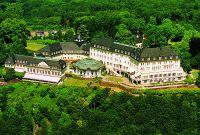 6. Steigenberger Grandhotel Petersberg, Bonn, Germany
6. Steigenberger Grandhotel Petersberg, Bonn, Germany
From its high vantage point atop the Petersberg mountain in the Siebengebirge ranges, the Steigenberger Grandhotel looks down on Königswinter and the River Rhine as it flows through North Rhine-Westphalia. Majestic and remote, the Grandhotel was founded in 1892, and has been the hotel of choice for many visiting heads of state, including Queen Elizabeth II of the United Kingdom, Emperor Haile Selassie I of Ethiopia, King Rama IX of Thailand and Emperor Akihito of Japan. The hotel also served as the seat of the Allied High Commission for Germany in the years following the Second World War. In addition to the breathtaking view from its open-air terrace and the royal splendor of its 99 rooms, the Grandhotel also features numerous paintings and antiquities, on loan from the German federal government, and a picture archive displaying images from its illustrious past.
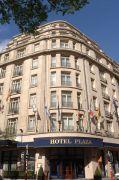 7. Le Plaza, Brussels, Belgium
7. Le Plaza, Brussels, Belgium
Inspired by the Four Seasons George V hotel in Paris, Le Plaza hotel in Brussels first opened in 1930, and masterfully conveys the elegance and luxury conceived by architect Michel Polak. Distinguished guests such as Winston Churchill admired the high ceilings, French facades in ‘pierre de France’, and open spaces, all of which contribute to the refined atmosphere of the hotel. Although Le Plaza ceased operations in 1976 due to widespread urban redevelopment, it was reopened in 1996 by Baron van Gysel de Meise and restored to its original glory. The Presidential Suite is particularly sensational, taking up a remarkable 340 square metres and featuring Verona marble floors and a jacuzzi. Le Plaza is only five minutes away from Grand Place, Brussels’ central square and most important tourist destination alongside the Mannekin Pis and Atomium sculpture.
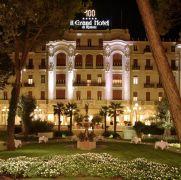 8. Grand Hotel Rimini, Rimini, Italy
8. Grand Hotel Rimini, Rimini, Italy
With its Liberty-style facades, classical architecture, and location on the Adriatic Coast, the Grand Hotel Rimini is one of the most beautiful places to stay in the Rimini region of Italy. Originally founded in 1908, the hotel was damaged in both the First and Second World Wars, but was always fully rebuilt. Its rooms have also been restored to the Venetian and French styles of the 18th Century, particularly with respect to the original wooden parquet floor and Venetian chandeliers. The Grand Hotel was the favorite destination of Italian Director Federico Fellini, and has been immortalized in many of his films; it was also declared a National Monument by the Italian Government in 1994 and placed under the protection of the Italian Fine Arts programme. Ancient monuments such as the Roman Amphitheatre, the Arch of Augustus and the Ponte d’Augusto are not to be missed.
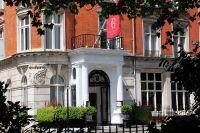 9. The Cadogan, London, United Kingdom
9. The Cadogan, London, United Kingdom
The Cadogan in London, built in 1887, is best known for the dalliances of its infamous guests, including King Edward of England, British actress Lillie Langtry, and playwright Oscar Wilde. Located close to Hyde Park, Buckingham Palace, and various museums, the Cadogan is in the heart of London’s cultural and tourist attractions. The hotel’s 65 rooms and suites are decorated in a modernised Edwardian style, and Langtry’s Restaurant offers creative dishes and imaginative combinations to tease and seduce your appetites.
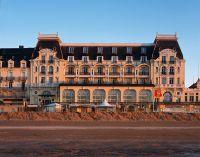 10. Grand Hotel de Cabourg, Cabourg, France
10. Grand Hotel de Cabourg, Cabourg, France
The Grand Hotel de Cabourg in Normandie opened in 1907 and is located in one of the best locations on the Channel coastline. The hotel was a favorite destination of French writer Marcel Proust, who immortalized it in his celebrated work In Search of Lost Time under the name Grand Hotel de Balbec. Proust was a regular visitor, and his room has been faithfully preserved. In addition to the grandiose guest rooms, balconies overlooking the sea, and wide terraces and gardens, fresh delicacies from the sea and surrounding region ensure that a stay at the Grand Hotel de Cabourg is an unforgettable treat for the senses.
The ranking is based on the top rated hotels in March 2010 on www.trivago.co.uk with the most interesting and exciting historical backgrounds.






